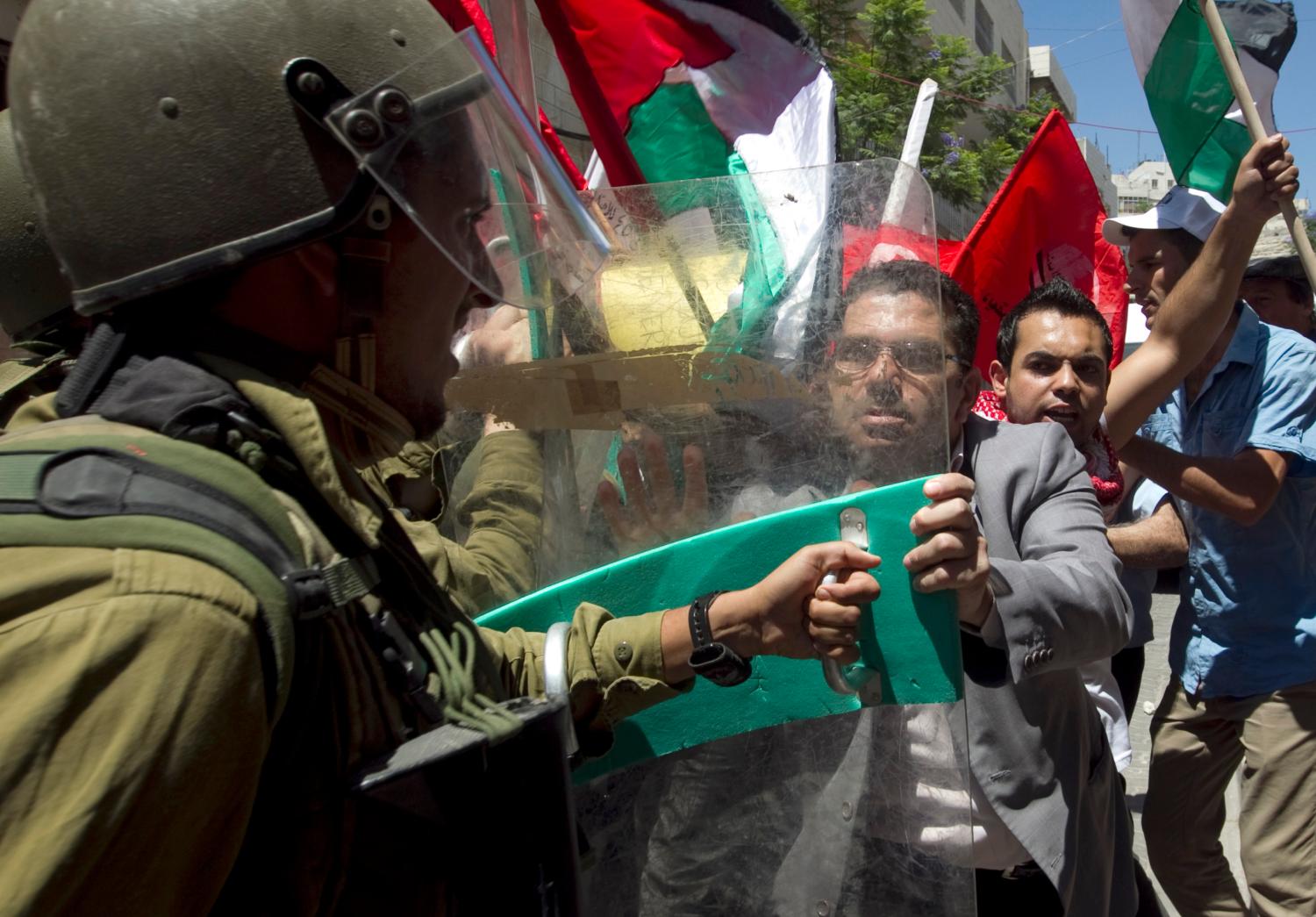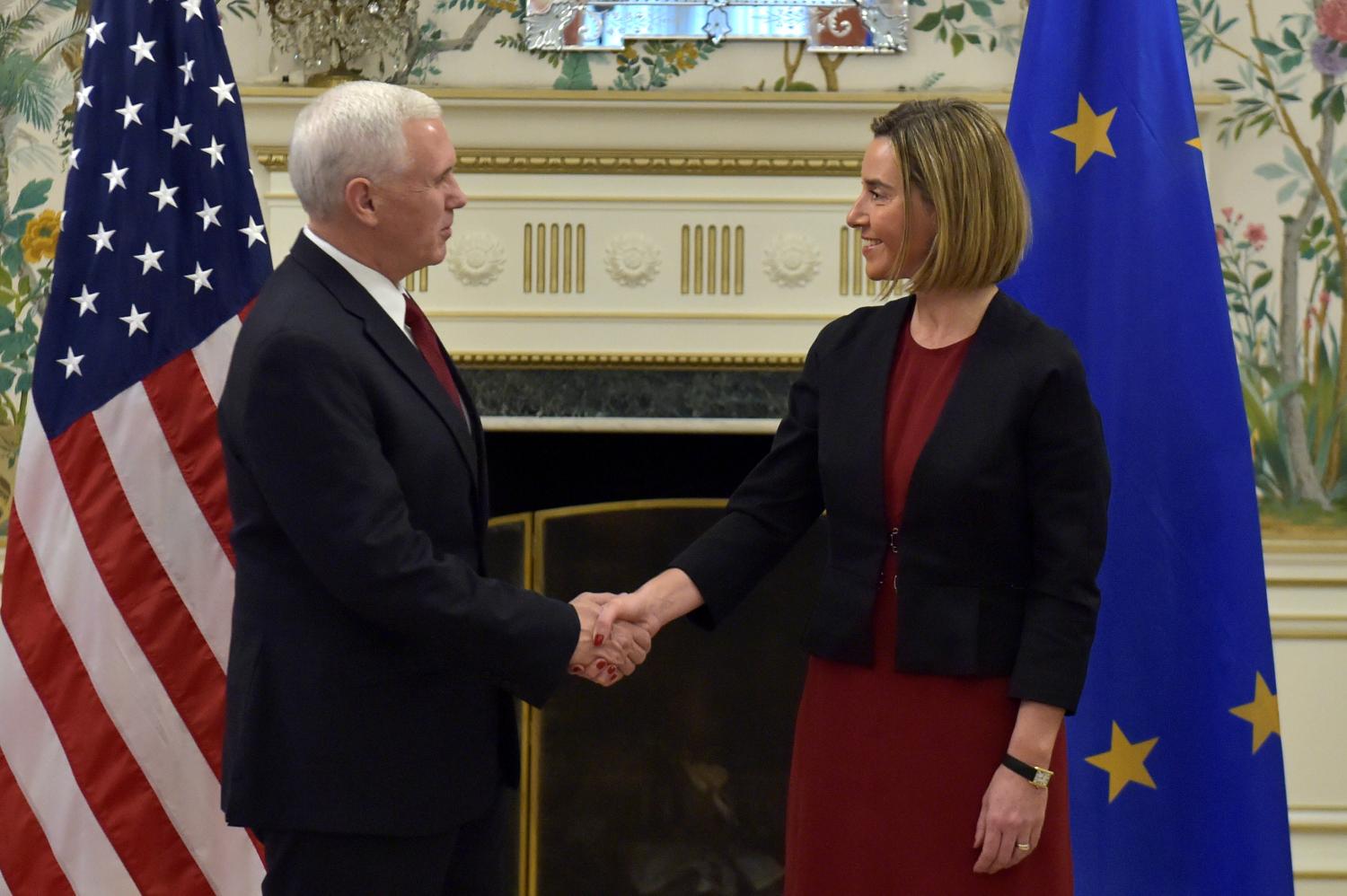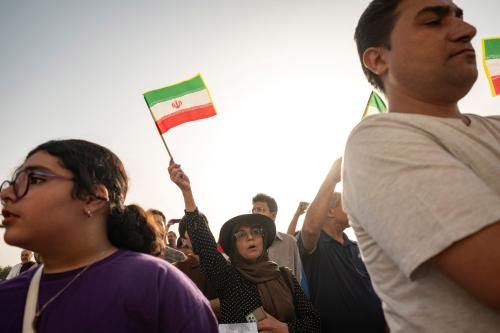We visited Israel and the Palestinian Authority for six days of conversations with the Israeli and Palestinian leadership and their advisers, as well as Israeli politicians from across the spectrum, and senior national security officials. Key findings:
• The overwhelming focus of Israeli politicians, from left to right, is on domestic social issues. The disintegration of Kadima (from winning 28 seats in the last election to polling at an astonishing zero today), has led them all to conclude that concentrating on the Palestinian issue has no current traction with Israeli voters.
• Although Prime Minister Netanyahu’s broad-based government now looks much more stable, confrontations over secular-religious relations, budget priorities, settlement activity, and the role of the Supreme Court could generate fractiousness and coalition collapse by Spring 2013. In the meantime, Netanyahu has greater scope for action, but the Israeli-Palestinian peace process is unlikely to be a significant beneficiary.
• Israeli officials are reassured by current P5+1 solidarity in the face of Iranian negotiating tactics, but worry that the Iranians are playing out the clock while increasing their stockpile of enriched uranium (now large enough for five bombs if further enriched).
• They watch Syria’s crisis anxiously, especially the army’s protection of its chemical weapons. While they see potential strategic advantage in Assad’s ouster, they fear a descent into chaos. For the time being they will sit on the sidelines, hoping that Assad’s demise will come sooner than later but, in contrast to earlier adventures in Lebanon, they do not yet see a path to effect that outcome.
• For West Bank Palestinians, like Israelis, life is relatively normal, despite an economic slowdown. They too do not evince much urgency to pursue a new set of political negotiations, or a more confrontational course. The economic situation of the Palestinian Authority, though, remains highly precarious and dependent on donor funding.
• Ironically, the absence of pressure might have its benefits. Palestinian President Mahmoud Abbas now seems willing to test Prime Minister Netanyahu’s talk of a new opportunity through a series of one-on-one conversations that should get underway shortly. This could generate improvements on the ground, though a major breakthrough seems unlikely.
• Abbas is simultaneously pursuing two other tracks far less likely to produce positive results — non-state membership in the UN General Assembly, and reconciliation talks with Hamas. Either of these could provoke confrontation with Israel and/or international actors.
Israel’s Domestic Politics: Mandate for…What?
Last month, Netanyahu called for new parliamentary elections in September, a year ahead of schedule. However, before the campaign got off the ground, he forged an agreement to bring Kadima, the largest party in the Knesset, into the governing coalition, giving him a mandate of an unprecedented 94 seats. the surprise move forestalled a political campaign that was to be fought largely on economic and social issues, offering opportunities for a reawakening on the left end of Israel’s political spectrum.
For Kadima’s newly elected leader, former Defense Minister Shaul Mofaz, the calculation to join the government was simple. Polls showed that in new elections, Kadima’s parliamentary delegation would be eliminated, meaning that many current members would lose their seats. For Netanyahu, the broader government freed him from a polarized parliament and made him less dependent on the right-wing faction within his own Likud Party and the religious parties. It also gave him up to 18 additional months before the uncertainty of elections. So although Netanyahu’s previous coalition was both stable and fairly productive in legislative terms, the expansion gives him flexibility and time to defuse domestic economic and social issues that were beginning to bolster his opposition. This added space was particularly useful as Netanyahu faces an increasingly brazen challenge from a nativist, pro-settlement, law-and-order faction within his own Likud party. In the run-up to elections, this intra-Likud rift will likely sharpen, as will the secular-religious rift over army service and welfare benefits, and a possible rift within Kadima as some seek the lifeline of rejoining Likud while others desert to the opposition.
Speculation in the Western press has focused on whether Netanyahu’s broader mandate would increase the likelihood of an Israeli strike on Iran or a new push for peace with the Palestinians. In our encounters, these issues were far from the center of discussion. Instead, four domestic issues were repeatedly cited as priorities for the government, including its new Kadima partners: electoral reform; resolving the issue of ultra-Orthodox Jews’ participation in military service; improving economic and social services, especially for the urban middle class; and dealing with the increasing number of illegal African migrants — now some 50,000 — who continue to seep across the border from Egypt’s Sinai Desert.
The Labor Party, after years of running on the imperative of Middle East peace, is returning to its leftist roots under the leadership of Shelly Yehimovich, a dynamic social democrat who is banking on populist rhetoric and a vibrant young volunteer staff. Yair Lapid, the former television personality and son of liberal gadfly Tommy Lapid, launched a new party seeking to represent the social protest movement, but lost momentum when elections were put on hold. Mofaz and Kadima must produce policy gains on social issues in order to justify joining the ruling coalition. Meanwhile, the Likud-led government is seeking to build up its track record — including by providing free early childhood education. The rising social demands and ever-rising defense spending may presage a confrontation in the Knesset over the national budget, which by law must be passed before the end of 2012 for the government to survive.
Although secular-religious tensions in Israel remain a source of concern on both left and right, the trend seems to be in favor of compromise policies that may, over time, improve the social integration of Israel’s ultra-religious (haredi) community into the mainstream. While haredi Israelis comprise only about 10% of the population, they represent 21% of the primary school population. Only 35% of haredi men work, and only a few thousand serve in the Israeli Defense Forces. All this places a disproportionate burden on the state’s social welfare system, creating grievances. However, growing economic pressures within the haredi community are driving more of them to seek paid employment and increase secular education for their children. Politicians we spoke to foresaw compromise on including more haredi Israelis in either military service or compulsory national service, and expect a new law on this subject to pass the Knesset before the judicially imposed deadline of September 1st. Over time, several interlocutors suggested, the haredi community will become more integrated into Israeli society, and their rabbinical leadership will lose its monopolistic influence over the community’s political and social engagement.
The migrant issue seems to encapsulate a number of current political trends. The government has been unable to halt the flow of migrants trafficked through Sinai from Sudan, Eritrea, and other conflict-ridden parts of East Africa. The migrants often face harrowing abuse by traffickers in Sinai before they are found and captured on the border. The Israeli government has insufficient legal or institutional capacity to handle this trend, whether through border protection and interdiction, social services, detention, or refugee processing. As a result, many illegal migrants end up undocumented; the lucky ones find illegal employment, while others end up homeless on the streets of poor neighborhoods in southern Tel Aviv, angering residents and adding to local problems of prostitution and organized crime. PM Netanyahu has promised to crack down on illegal employment of migrants, build a stronger border fence on the Sinai, and construct holding camps for migrants along the border. But while we were in Tel Aviv, an anti-immigrant rally attended by several ruling-party parliamentarians was followed by what newspapers called a ‘pogrom’ against African migrants in the area, in which local residents ran through the streets breaking windows and beating migrants they found on the street. The fallout from such incidents, in which politicians on the left and right trade accusations of racism and indifference to the country’s poor, underscores the volatility of the issue in domestic politics and its intersection with broader economic anxieties and frustration over state services.
Israel and the Region: Anxiously Watching and Waiting
As we met officials in Tel Aviv and Jerusalem, negotiators from the Perm 5+1 and Iran were meeting in Baghdad for a second round of talks over Iran’s nuclear program. Just a few months ago, many thought an Israeli strike on Iran was imminent, with no active diplomatic process and with Israeli officials warning that Iran was coming close to a “zone of immunity” in which its ability to achieve weapons capability would be unstoppable. For now, Netanyahu seems willing to give diplomacy a chance. While Israelis remain deeply skeptical that the talks will produce results that will place meaningful curbs on the Iranian nuclear program, they are reassured by the P5+1’s insistence at the end of the latest round of negotiations on the implementation of UNSC resolutions which call for a halt to Iranian enrichment. Iran’s unwillingness to accept the confidence building approach offered in Baghdad or the expected inspections agreement with the IAEA, however, has reinforced Israeli skepticism and led them to warn anew of Iran’s growing enriched uranium stockpile and capabilities. For the moment, they will wait to see whether impending oil import sanctions which take effect in July will generate a more flexible Iranian approach at the next round of negotiations in Moscow in mid-June. If the talks break down, expect renewed Israeli warnings of military action; if they make modest progress, expect growing tensions between Israel and those members of the P5+1 who may argue for a slackening of resolve.
The continued carnage in Syria was a topic of frequent conversation, and Israeli officials seem genuinely torn by the crisis there. At the strategic level, they see immense potential strategic advantage in a change in Damascus that would break Iran’s conduit to Hizballah and isolate it further in the region. They continue to assess Assad’s fall as inevitable although they have revised earlier optimistic assessments of his prompt demise. But while Israel reportedly has good intelligence on Syria’s military (where they see no cracks for the time being) and abilities to act there in covert and overt ways, Israel’s national security establishment considers it folly to attempt to hasten the process. They are especially conscious of the Syrian opposition’s fractiousness and lack of political authority, as well as the Muslim Brotherhood’s prominent role, and wonder who they would support. And the specter of another Lebanon hangs over Israeli thinking in much the same way that the shadow of Iraq hangs over American debates on intervention in another Arab country. So they watch warily from the sidelines, keeping close tabs on the Syrian army’s control of its chemical weapons stockpile and looking to Washington for leadership to end the crisis — much like Syrians themselves, so far in vain. Nevertheless as time passes, Israeli concern over the rise of yet another Sunni Islamist regime in Assad’s place or, worse, the collapse of Syria into sectarian warfare is making them increasingly uncomfortable. And if the Syrian army should lose control of its CW sites or capabilities, then Israel’s hand could be forced.
The first round of the Egyptian presidential elections took place while we were in Israel; most of our interlocutors have become resigned to Islamist dominance of Egypt (and the rest of North Africa) regardless of the electoral outcome, and hoped at best for a cold peace to continue. Their lack of familiarity with Islamist trends and movements in North Africa is notable, and the differences and debates among Islamist parties elude them. They worry about an Islamist Egyptian government abrogating the Camp David Treaty, but their most urgent concern was whether the military and security cooperation that functionally secures the peace day to day would suffer under civilian rule.
Palestine and Israel: The Status Quo is Sustainable…For Now
By comparison with these portentous events in neighboring countries, relations with the Palestinians seem trouble-free — for the moment. Both Hamas in Gaza and the Palestinian Authority in the West Bank are cooperating in the prevention of violence and terrorism. Enhanced economic relations are improving living standards for Palestinians in both areas. Some 50,000 West Bank Palestinian workers are now employed by the Israeli economy (a significant number in settlements), the highest number since the early Oslo years. It is even conceivable that with growing tax revenues the Palestinian Authority might be able to balance its budget by 2014 without dependence on foreign assistance. Although Arab funding has been sharply reduced and the PA is heavily in debt to Palestinian banks, Israel and the PA are now working together to explore an IMF facility that could generate new funding of up to $500 million to bridge the gap. The Palestinian economy is fragile though, still dependent on spending by the PA that trickles down and that demands a constant inflow of aid.
In this environment, with the United States, the EU and the Arab League preoccupied with other more pressing crises, neither Netanyahu nor Abu Mazen seem to feel any pressure to return to the negotiating table, or pursue other options. Ironically, it may be the very absence of that pressure that actually generates a new, more serious bilateral engagement. Quietly, the leaders’ representatives have been engaged in routine weekly meetings that appear to have produced agreement on a series of three meetings between Netanyahu and Abu Mazen. Since these would be “exploratory conversations” rather than formal negotiations, the demand for a settlement freeze has been put aside for the moment (although new Israeli settlement activity could bring them back in a hurry). Some on the Palestinian side are insisting that before the meetings take place, Netanyahu should release 123 pre-Oslo prisoners as well as rifles and vehicles for the Palestinian police that have been sitting in Jordan for years. It seems that Abu Mazen is inclined to accept Netanyahu’s argument that once they are talking it will be easier for him to take such actions and at least begin the direct encounter. Already last week, Netanyahu released to the PA bodies of Palestinian prisoners who had died in custody.
The Palestinian president’s intention seems to be to take away Netanyahu’s pretext and test whether anything has changed in his approach now that he is no longer dependent on right wing opponents of peace with the Palestinians for his government’s survival. Netanyahu appears ready to begin talking about either a final agreement or an interim agreement; Abu Mazen is ready to discuss an interim agreement as long as the ultimate endgame is first defined. It still seems unlikely that the two leaders, left to their own devices, could actually achieve a breakthrough but they might lay the groundwork for one once a newly-elected American president can consider whether to invest again in this always fraught exercise.
At the same time, however, Abu Mazen faces continual pressures to pursue steps that do not depend on Israeli cooperation. The reconciliation discussions with Hamas are ongoing to propose an interim government, headed by Abu Mazen, that would rule the PA until new elections (although many are skeptical those elections would ever take place). Reconciliation could, if it progresses, put Salam Fayyad out of a job and potentially threaten aid flows. In addition, Abu Mazen keeps the prospect of UN action on the table — specificially, seeking non-state member status in the UN General Assembly when it reconvenes this September. As with last year’s abortive Security Council gambit, this move would produce a crisis in Palestinian relations with Israel and the Quartet while providing nothing more than a hollow symbolic victory.
The Brookings Institution is committed to quality, independence, and impact.
We are supported by a diverse array of funders. In line with our values and policies, each Brookings publication represents the sole views of its author(s).






